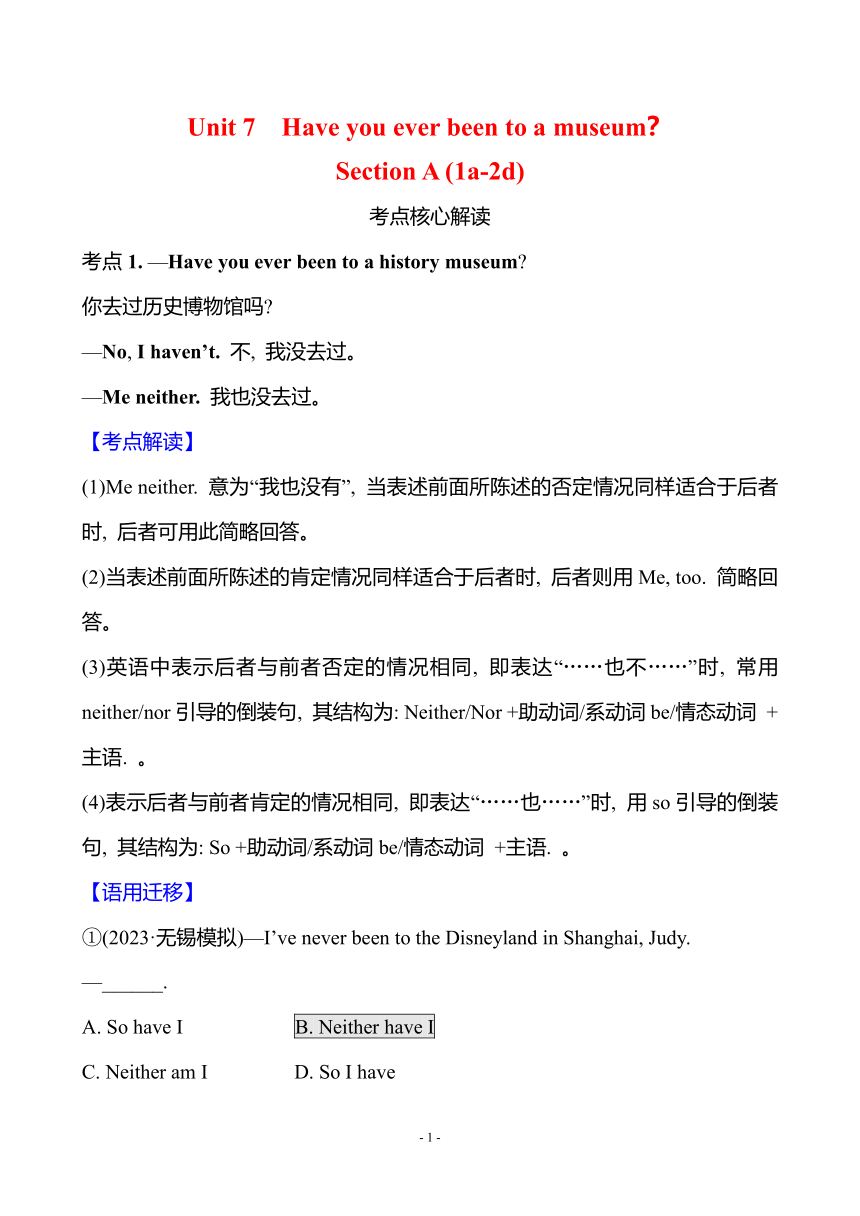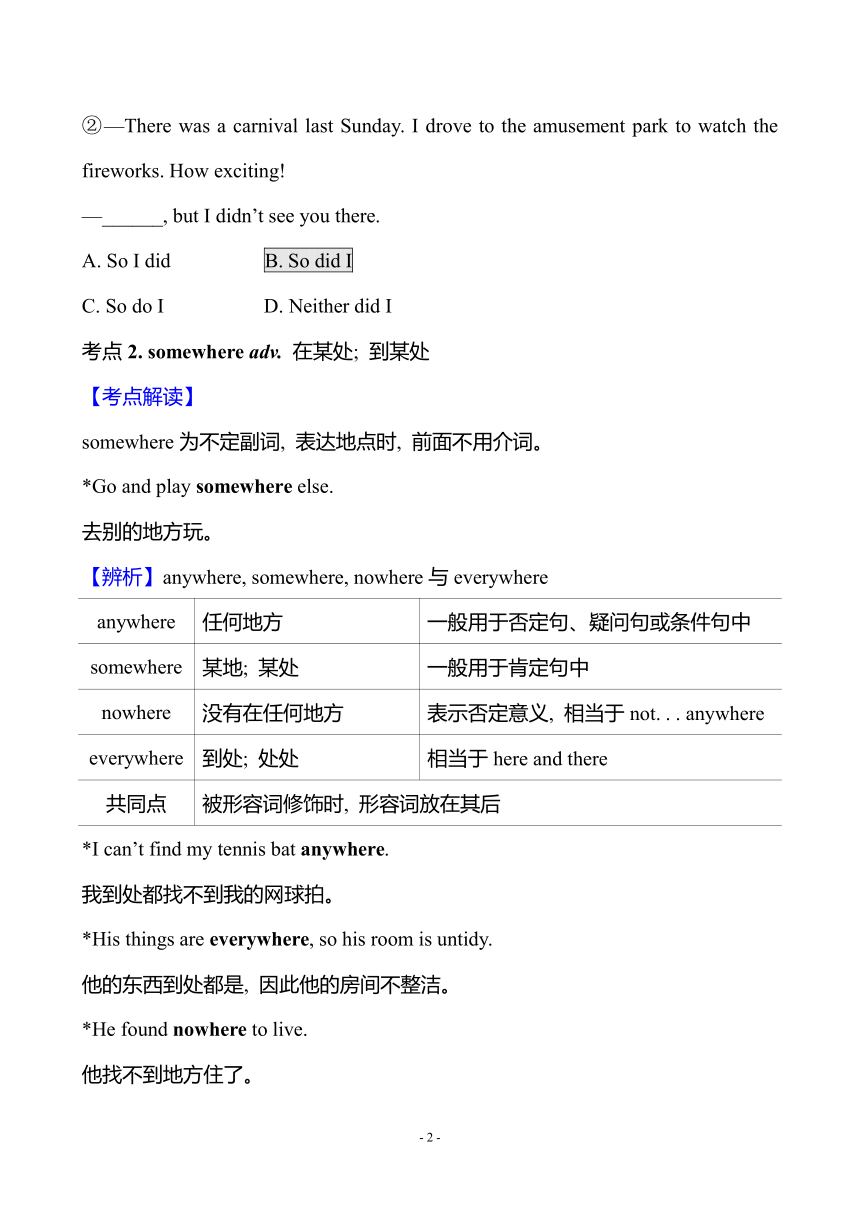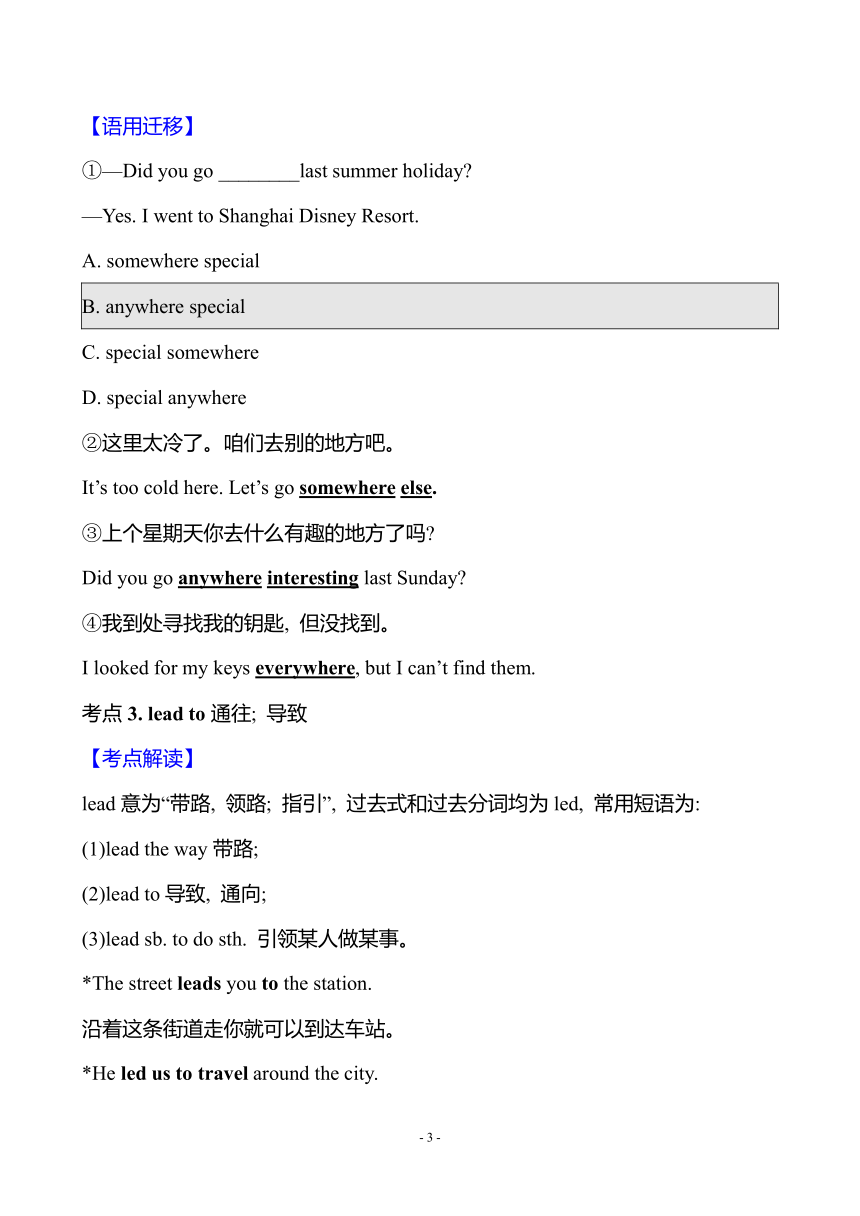Unit 7 Have you ever been to a museum?Section A (1a-2d) 学案 2024-2025学年英语鲁教版八年级上册
文档属性
| 名称 | Unit 7 Have you ever been to a museum?Section A (1a-2d) 学案 2024-2025学年英语鲁教版八年级上册 |

|
|
| 格式 | docx | ||
| 文件大小 | 28.9KB | ||
| 资源类型 | 教案 | ||
| 版本资源 | 鲁教版 | ||
| 科目 | 英语 | ||
| 更新时间 | 2024-06-13 17:24:02 | ||
图片预览



文档简介
Unit 7 Have you ever been to a museum?
Section A (1a-2d)
考点核心解读
考点1. —Have you ever been to a history museum
你去过历史博物馆吗
—No, I haven’t. 不, 我没去过。
—Me neither. 我也没去过。
【考点解读】
(1)Me neither. 意为“我也没有”, 当表述前面所陈述的否定情况同样适合于后者时, 后者可用此简略回答。
(2)当表述前面所陈述的肯定情况同样适合于后者时, 后者则用Me, too. 简略回答。
(3)英语中表示后者与前者否定的情况相同, 即表达“……也不……”时, 常用neither/nor引导的倒装句, 其结构为: Neither/Nor +助动词/系动词be/情态动词 +主语. 。
(4)表示后者与前者肯定的情况相同, 即表达“……也……”时, 用so引导的倒装句, 其结构为: So +助动词/系动词be/情态动词 +主语. 。
【语用迁移】
①(2023·无锡模拟)—I’ve never been to the Disneyland in Shanghai, Judy.
—______.
A. So have I B. Neither have I
C. Neither am I D. So I have
②—There was a carnival last Sunday. I drove to the amusement park to watch the fireworks. How exciting!
—______, but I didn’t see you there.
A. So I did B. So did I
C. So do I D. Neither did I
考点2. somewhere adv. 在某处; 到某处
【考点解读】
somewhere为不定副词, 表达地点时, 前面不用介词。
*Go and play somewhere else.
去别的地方玩。
【辨析】anywhere, somewhere, nowhere与everywhere
anywhere 任何地方 一般用于否定句、疑问句或条件句中
somewhere 某地; 某处 一般用于肯定句中
nowhere 没有在任何地方 表示否定意义, 相当于not. . . anywhere
everywhere 到处; 处处 相当于here and there
共同点 被形容词修饰时, 形容词放在其后
*I can’t find my tennis bat anywhere.
我到处都找不到我的网球拍。
*His things are everywhere, so his room is untidy.
他的东西到处都是, 因此他的房间不整洁。
*He found nowhere to live.
他找不到地方住了。
【语用迁移】
①—Did you go ________last summer holiday
—Yes. I went to Shanghai Disney Resort.
A. somewhere special
B. anywhere special
C. special somewhere
D. special anywhere
②这里太冷了。咱们去别的地方吧。
It’s too cold here. Let’s go somewhere else.
③上个星期天你去什么有趣的地方了吗
Did you go anywhere interesting last Sunday
④我到处寻找我的钥匙, 但没找到。
I looked for my keys everywhere, but I can’t find them.
考点3. lead to通往; 导致
【考点解读】
lead意为“带路, 领路; 指引”, 过去式和过去分词均为led, 常用短语为:
(1)lead the way带路;
(2)lead to导致, 通向;
(3)lead sb. to do sth. 引领某人做某事。
*The street leads you to the station.
沿着这条街道走你就可以到达车站。
*He led us to travel around the city.
他带领我们游览了这座城市。
*All roads lead to Rome.
条条大路通罗马。
【语用迁移】
①这条路通往我的学校。
The road leads to my school.
②你能带领我去公交车站吗
Can you lead me to the bus station
课时分层演练
【A层 基础练】
Ⅰ. 用方框中所给单词的适当形式填空
amusement, lead, camera, invent, somewhere
1. He likes taking photos, so he always takes cameras.
2. I went to a(n) amusement park with my best friend.
3. Let’s find somewhere quiet to have a rest.
4. Last year, the tour guide led us to travel around the small country.
5. I think the Internet is a very great invention.
Ⅱ. 用所给词的适当形式填空
1. Neither of them has been(be)to the Great Wall before.
2. They went(go)to the Water World a week ago.
3. I have finished(finish) my homework already.
4. The young man has led(lead) the research successfully already.
5. Look! Frank and his friends are going skating(skate).
Ⅲ. 完成句子
1. 他曾经去过广州吗
Has he ever been to Guangzhou
2. 今年暑假我们一家人要去个不同的地方。
This summer holiday my family will go somewhere different.
3. 吃太多的糖会导致健康问题。
Eating too much sugar can lead to health problems.
4. 大声朗读是一种学习英语的好方法。
Reading aloud is a good/great way to learn English.
5. 我们在湖边搭起帐篷, 并生火做饭。
We put up a tent by a lake and made a fire to cook food.
【B层 能力练】
Ⅳ. 阅读理解
A city in the Republic of Korea has added a new attraction to its cultural landscape(景观)—the world’s first “Toilet Theme Park”. The Restroom Cultural Park in the city of Suwon is proving a huge hit with locals and tourists alike.
The park was built to memorize the former city mayor Sim Jae-duck, known as “Mr Toilet”. He believed the toilet is a very important place and full of culture. Visitors to the park can enjoy its toilet-bowl-shaped exhibition hall as well as lots of bronze statues(铜像) in all kinds of toilet positions. They can even sit on Mr Sim’s original toilet, which includes a full-length glass door that mists(蒙上薄雾)up when it is being used.
Suwon has become well known because of the promotion of toilet culture. The city attracts toilet-related artwork from around the world to its galleries. It famously hosts the Golden Poop Art Festival—a celebration of one of the calls of nature. The city also lists lots of its own public toilets as tourist attractions on its website. Sim Jae-duck’s toilet-shaped house, now a museum, should be the must-see for enthusiasts. It’s said that Mr Sim was born in the loo(洗手间)of his mother’s house, so he loved toilets very much. He said in 2007, “The toilet can save humankind from diseases and is a place for introspection(反省). The toilet is also a central living place that has culture. ”
1. What’s the theme park’s name
A. Restroom Park.
B. Toilet World.
C. The Restroom Cultural Park.
D. The Park of World Toilets.
2. What was the nickname(绰号)of Sim Jae-duck
A. Captain Lavatory.
B. Mr Toilet.
C. Bathroom Bill.
D. Number Two.
3. What happens to Sim Jae-duck’s toilet when someone uses it
A. The toilet slowly moves around.
B. “The Toilet Song” starts playing.
C. The water comes out.
D. Its glass door fogs up.
4. Where do reports say Sim Jae-duck was born
A. A toilet-shaped bed.
B. The toilet of his mother’s house.
C. A public toilet in Suwon.
D. A hospital toilet.
5. The underlined word “enthusiasts” means “______” in Chinese in the passage.
A. 思想家 B. 智障者
C. 残疾人 D. 爱好者
【词汇积累】
attraction/ tr k n/ n. 吸引; 有吸引力的事
memorize/ mem ra z/ v. 记住
promotion/pr m n/ n. 提拔; 促进
- 7 -
Section A (1a-2d)
考点核心解读
考点1. —Have you ever been to a history museum
你去过历史博物馆吗
—No, I haven’t. 不, 我没去过。
—Me neither. 我也没去过。
【考点解读】
(1)Me neither. 意为“我也没有”, 当表述前面所陈述的否定情况同样适合于后者时, 后者可用此简略回答。
(2)当表述前面所陈述的肯定情况同样适合于后者时, 后者则用Me, too. 简略回答。
(3)英语中表示后者与前者否定的情况相同, 即表达“……也不……”时, 常用neither/nor引导的倒装句, 其结构为: Neither/Nor +助动词/系动词be/情态动词 +主语. 。
(4)表示后者与前者肯定的情况相同, 即表达“……也……”时, 用so引导的倒装句, 其结构为: So +助动词/系动词be/情态动词 +主语. 。
【语用迁移】
①(2023·无锡模拟)—I’ve never been to the Disneyland in Shanghai, Judy.
—______.
A. So have I B. Neither have I
C. Neither am I D. So I have
②—There was a carnival last Sunday. I drove to the amusement park to watch the fireworks. How exciting!
—______, but I didn’t see you there.
A. So I did B. So did I
C. So do I D. Neither did I
考点2. somewhere adv. 在某处; 到某处
【考点解读】
somewhere为不定副词, 表达地点时, 前面不用介词。
*Go and play somewhere else.
去别的地方玩。
【辨析】anywhere, somewhere, nowhere与everywhere
anywhere 任何地方 一般用于否定句、疑问句或条件句中
somewhere 某地; 某处 一般用于肯定句中
nowhere 没有在任何地方 表示否定意义, 相当于not. . . anywhere
everywhere 到处; 处处 相当于here and there
共同点 被形容词修饰时, 形容词放在其后
*I can’t find my tennis bat anywhere.
我到处都找不到我的网球拍。
*His things are everywhere, so his room is untidy.
他的东西到处都是, 因此他的房间不整洁。
*He found nowhere to live.
他找不到地方住了。
【语用迁移】
①—Did you go ________last summer holiday
—Yes. I went to Shanghai Disney Resort.
A. somewhere special
B. anywhere special
C. special somewhere
D. special anywhere
②这里太冷了。咱们去别的地方吧。
It’s too cold here. Let’s go somewhere else.
③上个星期天你去什么有趣的地方了吗
Did you go anywhere interesting last Sunday
④我到处寻找我的钥匙, 但没找到。
I looked for my keys everywhere, but I can’t find them.
考点3. lead to通往; 导致
【考点解读】
lead意为“带路, 领路; 指引”, 过去式和过去分词均为led, 常用短语为:
(1)lead the way带路;
(2)lead to导致, 通向;
(3)lead sb. to do sth. 引领某人做某事。
*The street leads you to the station.
沿着这条街道走你就可以到达车站。
*He led us to travel around the city.
他带领我们游览了这座城市。
*All roads lead to Rome.
条条大路通罗马。
【语用迁移】
①这条路通往我的学校。
The road leads to my school.
②你能带领我去公交车站吗
Can you lead me to the bus station
课时分层演练
【A层 基础练】
Ⅰ. 用方框中所给单词的适当形式填空
amusement, lead, camera, invent, somewhere
1. He likes taking photos, so he always takes cameras.
2. I went to a(n) amusement park with my best friend.
3. Let’s find somewhere quiet to have a rest.
4. Last year, the tour guide led us to travel around the small country.
5. I think the Internet is a very great invention.
Ⅱ. 用所给词的适当形式填空
1. Neither of them has been(be)to the Great Wall before.
2. They went(go)to the Water World a week ago.
3. I have finished(finish) my homework already.
4. The young man has led(lead) the research successfully already.
5. Look! Frank and his friends are going skating(skate).
Ⅲ. 完成句子
1. 他曾经去过广州吗
Has he ever been to Guangzhou
2. 今年暑假我们一家人要去个不同的地方。
This summer holiday my family will go somewhere different.
3. 吃太多的糖会导致健康问题。
Eating too much sugar can lead to health problems.
4. 大声朗读是一种学习英语的好方法。
Reading aloud is a good/great way to learn English.
5. 我们在湖边搭起帐篷, 并生火做饭。
We put up a tent by a lake and made a fire to cook food.
【B层 能力练】
Ⅳ. 阅读理解
A city in the Republic of Korea has added a new attraction to its cultural landscape(景观)—the world’s first “Toilet Theme Park”. The Restroom Cultural Park in the city of Suwon is proving a huge hit with locals and tourists alike.
The park was built to memorize the former city mayor Sim Jae-duck, known as “Mr Toilet”. He believed the toilet is a very important place and full of culture. Visitors to the park can enjoy its toilet-bowl-shaped exhibition hall as well as lots of bronze statues(铜像) in all kinds of toilet positions. They can even sit on Mr Sim’s original toilet, which includes a full-length glass door that mists(蒙上薄雾)up when it is being used.
Suwon has become well known because of the promotion of toilet culture. The city attracts toilet-related artwork from around the world to its galleries. It famously hosts the Golden Poop Art Festival—a celebration of one of the calls of nature. The city also lists lots of its own public toilets as tourist attractions on its website. Sim Jae-duck’s toilet-shaped house, now a museum, should be the must-see for enthusiasts. It’s said that Mr Sim was born in the loo(洗手间)of his mother’s house, so he loved toilets very much. He said in 2007, “The toilet can save humankind from diseases and is a place for introspection(反省). The toilet is also a central living place that has culture. ”
1. What’s the theme park’s name
A. Restroom Park.
B. Toilet World.
C. The Restroom Cultural Park.
D. The Park of World Toilets.
2. What was the nickname(绰号)of Sim Jae-duck
A. Captain Lavatory.
B. Mr Toilet.
C. Bathroom Bill.
D. Number Two.
3. What happens to Sim Jae-duck’s toilet when someone uses it
A. The toilet slowly moves around.
B. “The Toilet Song” starts playing.
C. The water comes out.
D. Its glass door fogs up.
4. Where do reports say Sim Jae-duck was born
A. A toilet-shaped bed.
B. The toilet of his mother’s house.
C. A public toilet in Suwon.
D. A hospital toilet.
5. The underlined word “enthusiasts” means “______” in Chinese in the passage.
A. 思想家 B. 智障者
C. 残疾人 D. 爱好者
【词汇积累】
attraction/ tr k n/ n. 吸引; 有吸引力的事
memorize/ mem ra z/ v. 记住
promotion/pr m n/ n. 提拔; 促进
- 7 -
同课章节目录
- Unit 1 Could you please clean your room?
- Section A
- Section B
- Unit 2 Why don't you talk to your parents?
- Section A
- Section B
- Unit 3 What were you doing when the rainstorm came
- Section A
- Section B
- Unit 4 An old man tried to move the mountains.
- Section A
- Section B
- Unit 5 What's the highest mountain in the world?
- Section A
- Section B
- Unit 6 Have you read Treasure Island yet?
- Section A
- Section B
- Unit 7 Have you ever been to a museum?
- Section A
- Section B
- Unit 8 I've had this bike for three years.
- Section A
- Section B
